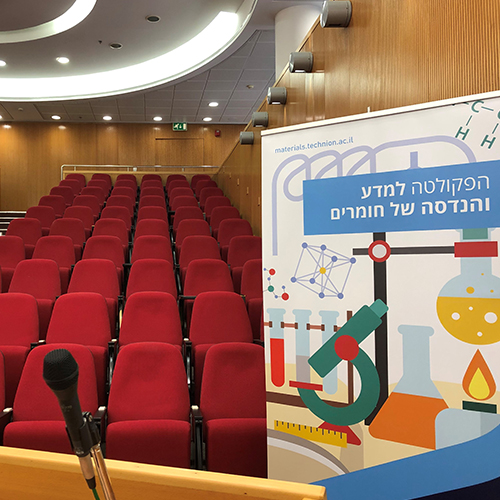
19/07/2025
David Wang Auditorium, 3rd floor, Dalia Maydan Bldg.
Ms. Keren Mizrahi MSc candidate
Department of Materials Science and Engineering, Technion Israel Institute of Technology Haifa
Keren Mizrahi is currently in her second year at the Technion, pursuing an M.Sc. in Materials Engineering under the supervision of Prof. Silverstein. Her research topic is synthesizing block-copolymer-based emulsion-templated porous polymers. She earned her Bachelor of Science in Chemistry at Tel Aviv University in 2021 as well as a Bachelor of Science in Materials Engineering. Her long-term goal is to undertake a Ph.D. and then work as a research engineer.
Porous polymers are of interest for a wide variety of applications. Emulsion templating has been used to generate porous polystyrene crosslinked with divinylbenzene (DVB) (PSD), but these polymers were not rubber-toughened. The objective of this research was to synthesize rubber-toughened, emulsion-templated PSD monoliths through atom transfer radical polymerization (ATRP) of styrene and DVB from a rubbery macroinitiator (MI) within a high internal phase emulsion, yielding triblock-copolymer-like macromolecular structures. ATRP of PSD alone produced a much narrower tan δ peak than free radical polymerization, indicating a more homogeneous network structure. The MI was based on either poly(dimethyl siloxane) (PDMS) or hydroxy-terminated polybutadiene (HTPB). Porous, crosslinked PSD-PDMS-PSD and PSD-HTPB-PSD monoliths with densities of around 0.12 g/cm3 were successfully synthesized. Higher PSD contents produced a typical emulsion-templated structure, while lower PSD contents produced elastomeric behavior. The monoliths exhibited extremely wide tan δ peaks (~124 °C), perhaps indicating an interpenetrating-network-like structure.


